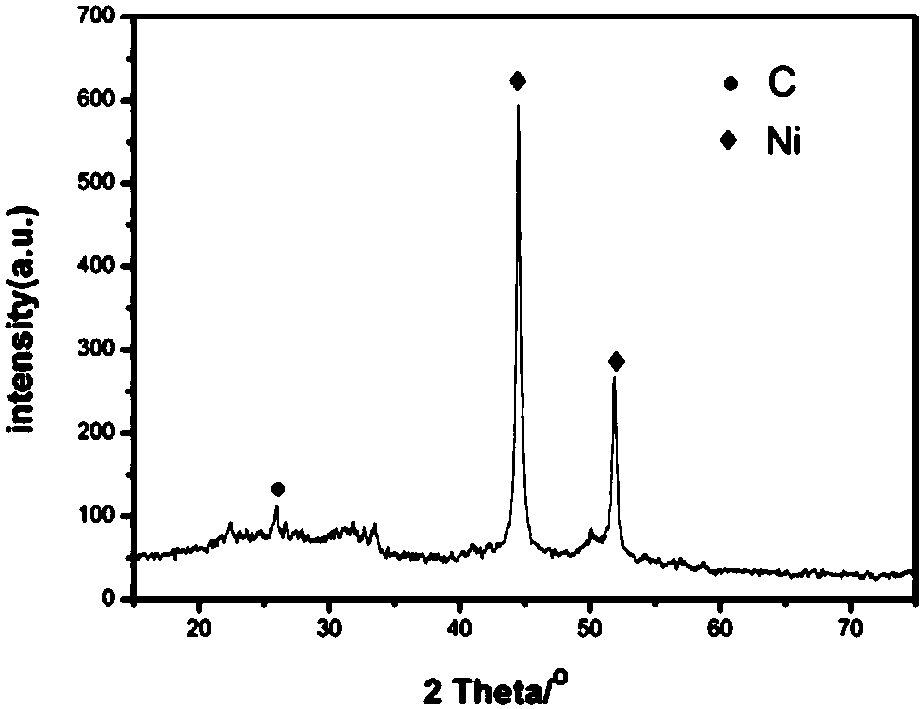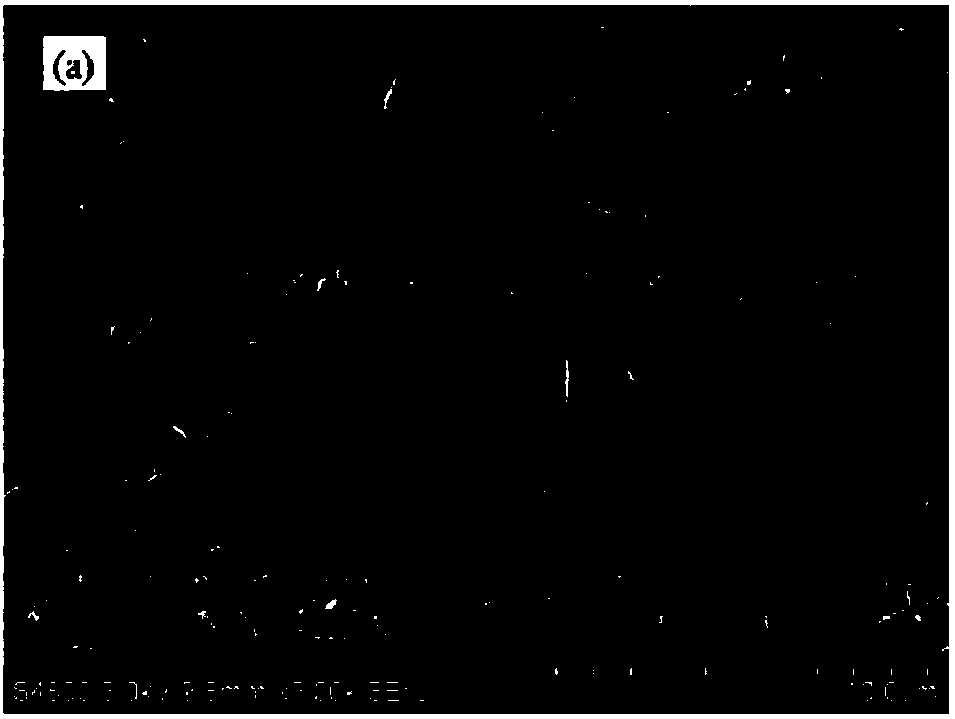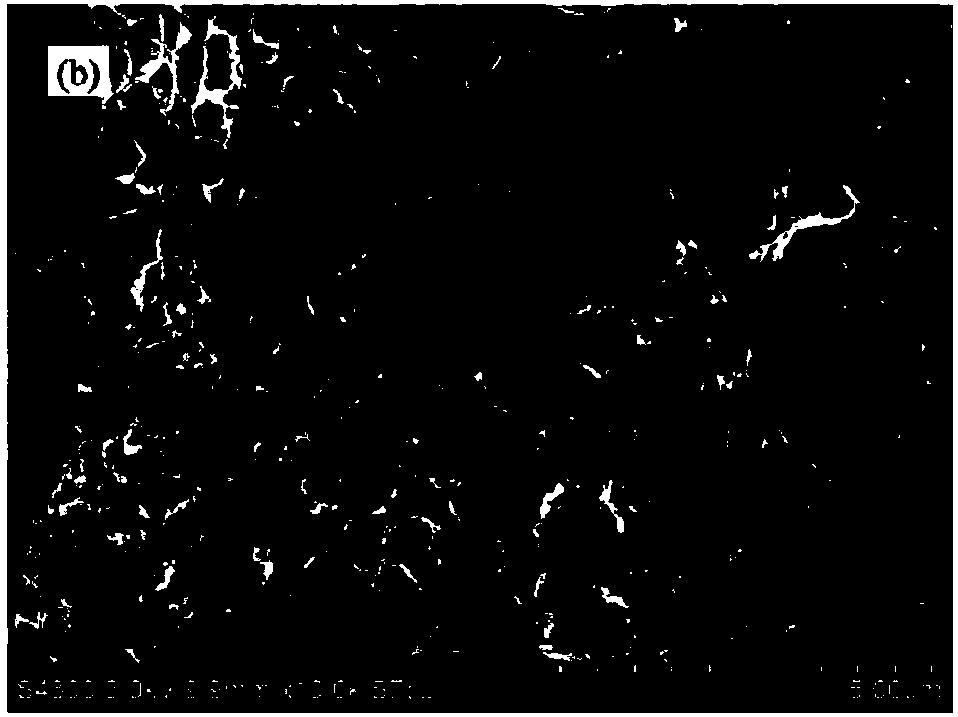A preparation method of porous carbon-loaded graphene-coated nano-nickel particle absorbing material
A graphene-coated, microwave-absorbing material technology, applied in nanotechnology, chemical instruments and methods, transportation and packaging, etc., can solve the problems of high price, high cost of composite materials and difficult to popularize and apply, and achieve low cost and improve microwave absorption. Performance, effect of high specific surface area
- Summary
- Abstract
- Description
- Claims
- Application Information
AI Technical Summary
Problems solved by technology
Method used
Image
Examples
Embodiment 1
[0024] Step 1: Prepare a nickel nitrate solution with a concentration of 0.05 mol / L, select 20 g of natural algae plants, and soak the algae in the prepared nickel nitrate solution for 24 hours. Wherein, the natural algae plant is laver.
[0025] Step 2: crush the soaked algae with a mixer, centrifuge and take the centrifuged product for freeze-drying, and after it is completely dry, pulverize and grind to obtain powder sample A.
[0026] Step 3: Weigh an appropriate amount of sample A, place it in a vacuum reaction furnace, and heat it at 200°C for 30 minutes to obtain sample B.
[0027] Step 4: Weigh an appropriate amount of sample B, place it in a vacuum reaction furnace, and heat it at 300°C for 30 minutes to obtain sample C.
[0028] Step 5: Weigh an appropriate amount of sample C, place it in a high-temperature tube furnace, and heat it for 30 minutes at 500°C under an argon atmosphere to obtain a porous carbon-loaded graphene-coated nano-nickel particle absorbing mater...
Embodiment 2
[0031] Step 1: Prepare a nickel nitrate solution with a concentration of 0.05 mol / L, select 20 g of natural algae plants, and soak the algae in the prepared nickel nitrate solution for 24 hours. Among them, the natural algae plant is Porphyridium coccus.
[0032] Step 2: crush the soaked algae with a mixer, centrifuge and take the centrifuged product for freeze-drying, and after it is completely dry, pulverize and grind to obtain powder sample A.
[0033] Step 3: Weigh an appropriate amount of sample A, place it in a vacuum reaction furnace, and heat it at 200°C for 30 minutes to obtain sample B.
[0034] Step 4: Weigh an appropriate amount of sample B, place it in a vacuum reaction furnace, and heat it at 350°C for 30 minutes to obtain sample C.
[0035] Step 5: Weigh an appropriate amount of sample C, place it in a high-temperature tube furnace, and heat it for 30 minutes at 500°C under an argon atmosphere to obtain a porous carbon-loaded graphene-coated nano-nickel particl...
Embodiment 3
[0038] Step 1: Prepare a nickel nitrate solution with a concentration of 0.10 mol / L, select 20 g of natural algae plants, and soak the algae in the prepared nickel nitrate solution for 24 hours. Among them, the natural algae plant is Ulva.
[0039] Step 2: crush the soaked algae with a mixer, centrifuge and take the centrifuged product for freeze-drying, and after it is completely dry, pulverize and grind to obtain powder sample A.
[0040] Step 3: Weigh an appropriate amount of sample A, place it in a vacuum reaction furnace, and heat it at 250°C for 30 minutes to obtain sample B.
[0041] Step 4: Weigh an appropriate amount of sample B, place it in a vacuum reaction furnace, and heat it at 400°C for 30 minutes to obtain sample C.
[0042] Step 5: Weigh an appropriate amount of sample C, place it in a high-temperature tube furnace, and heat it for 30 minutes at 600°C under an argon atmosphere to obtain a porous carbon-supported graphene-coated nano-nickel particle absorbing ...
PUM
 Login to View More
Login to View More Abstract
Description
Claims
Application Information
 Login to View More
Login to View More - R&D
- Intellectual Property
- Life Sciences
- Materials
- Tech Scout
- Unparalleled Data Quality
- Higher Quality Content
- 60% Fewer Hallucinations
Browse by: Latest US Patents, China's latest patents, Technical Efficacy Thesaurus, Application Domain, Technology Topic, Popular Technical Reports.
© 2025 PatSnap. All rights reserved.Legal|Privacy policy|Modern Slavery Act Transparency Statement|Sitemap|About US| Contact US: help@patsnap.com



